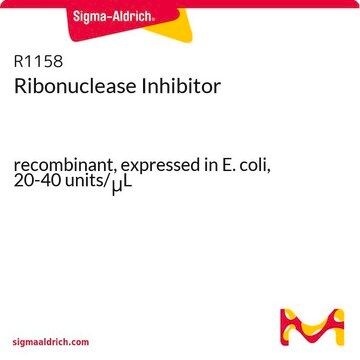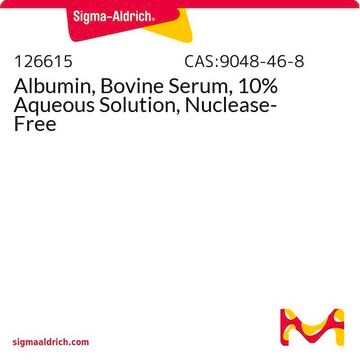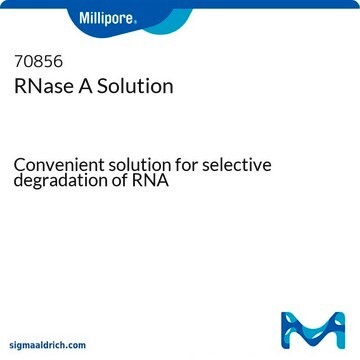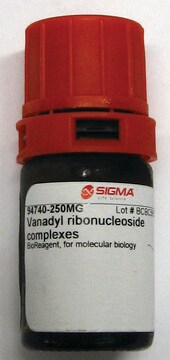R2520
Ribonuclease inhibitor human
Inhibits ribonucleases during transcription and translation experiments
Synonym(s):
RNase Inhibitor, Ribonuclease Inhibitor
Sign Into View Organizational & Contract Pricing
All Photos(2)
About This Item
Recommended Products
biological source
human placenta
grade
for molecular biology
form
buffered aqueous solution
mol wt
~50 kDa
concentration
30,000-50,000 units/mL
shipped in
dry ice
storage temp.
−20°C
Looking for similar products? Visit Product Comparison Guide
General description
Ribonuclease inhibitor works to inhibit RNase activity by forming a tight, non-covalent 1:1 complex. It is human placenta. It inhibits RNases A, B, and C. It will not inhibit RNases H, 1, T1, S1 Nuclease, SP6, T7 RNA Polymerase, T3 RNA Polymerase, AMV Reverse Transcriptase, M-MLV Reverse Transcriptase, or Taq Polymerase. The inhibitor can be removed by phenol extraction or by heating to 65°C for 10 minutes.
Application
Suitable for use in
- in vitro inhibition of ribonucleases
- cDNA synthesis
- RT-PCR
- in vitro transcription and translation
Useful for in vitro inhibition of ribonucleases, including procedures like cDNA synthesis, RT-PCR, and in vitro transcription and translation.
Biochem/physiol Actions
Inhibits RNase by forming a tight, non-covalent 1:1 complex. Also inhibits angiogenin, a neovascularization promoter which is homologous with RNase A.
Components
Ribonuclease Inhibitor is provided as a solution in 20 mM HEPES-KOH( pH 7.6), 50 mM KCl, 8 mM DTT and 50% glycerol.
Other Notes
This inhibitor of RNase activity is isolated from human placenta and supplied as a buffered aqueous glycerol solution.
Solution in 50% glycerol, 20 mM HEPES-KOH, pH 7.6, 50 mM KCl and 8 mM DTT
Unit Definition
One unit will reduce the activity of 5 ng of ribonuclease A by 50% in a cytidine 2′:3′-cyclic monophosphate system.
Physical form
Solution in 50% glycerol, 20 mM HEPES-KOH, pH 7.6, 50 mM KCl and 8 mM DTT
replaced by
Product No.
Description
Pricing
Storage Class Code
12 - Non Combustible Liquids
WGK
WGK 3
Flash Point(F)
Not applicable
Flash Point(C)
Not applicable
Personal Protective Equipment
dust mask type N95 (US), Eyeshields, Gloves
Certificates of Analysis (COA)
Search for Certificates of Analysis (COA) by entering the products Lot/Batch Number. Lot and Batch Numbers can be found on a product’s label following the words ‘Lot’ or ‘Batch’.
Already Own This Product?
Find documentation for the products that you have recently purchased in the Document Library.
Customers Also Viewed
Mariona Estapé Senti et al.
Journal of controlled release : official journal of the Controlled Release Society, 341, 475-486 (2021-12-11)
PEGylation of lipid-based nanoparticles and other nanocarriers is widely used to increase their stability and plasma half-life. However, either pre-existing or de novo formed anti-PEG antibodies can induce hypersensitivity reactions and accelerated blood clearance through binding to the nanoparticle surfaces
Sabahattin Kaymakoglu et al.
Antimicrobial agents and chemotherapy, 49(3), 1135-1138 (2005-02-25)
The success of alpha interferon (IFN-alpha) monotherapy for the treatment of chronic hepatitis D is very limited. In this study, the efficacy of IFN-alpha and ribavirin combination therapy for chronic hepatitis D was investigated. Nineteen patients (15 males; mean age
Ribonuclease inhibitor from human placenta: interaction with derivatives of ribonuclease A.
P Blackburn et al.
The Journal of biological chemistry, 254(24), 12488-12493 (1979-12-25)
Michal Mikula et al.
The Journal of biological chemistry, 286(11), 9763-9775 (2011-01-15)
Components of the ERK cascade are recruited to genes, but it remains unknown how they are regulated at these sites. The RNA-binding protein heterogeneous nuclear ribonucleoprotein (hnRNP) K interacts with kinases and is found along genes including the mitogen-inducible early
Malia Su-Qin Murphy et al.
American journal of obstetrics and gynecology, 213(3), 367-367 (2015-05-20)
Preeclampsia (PE) is a hypertensive disorder of pregnancy characterized by widespread maternal endothelial dysfunction. Although clinical signs subside following delivery, long-term risks associated with PE include hypertension, stroke, and cardiovascular disease. MicroRNAs (miRNAs) are emerging as critical regulators of biological
Our team of scientists has experience in all areas of research including Life Science, Material Science, Chemical Synthesis, Chromatography, Analytical and many others.
Contact Technical Service












